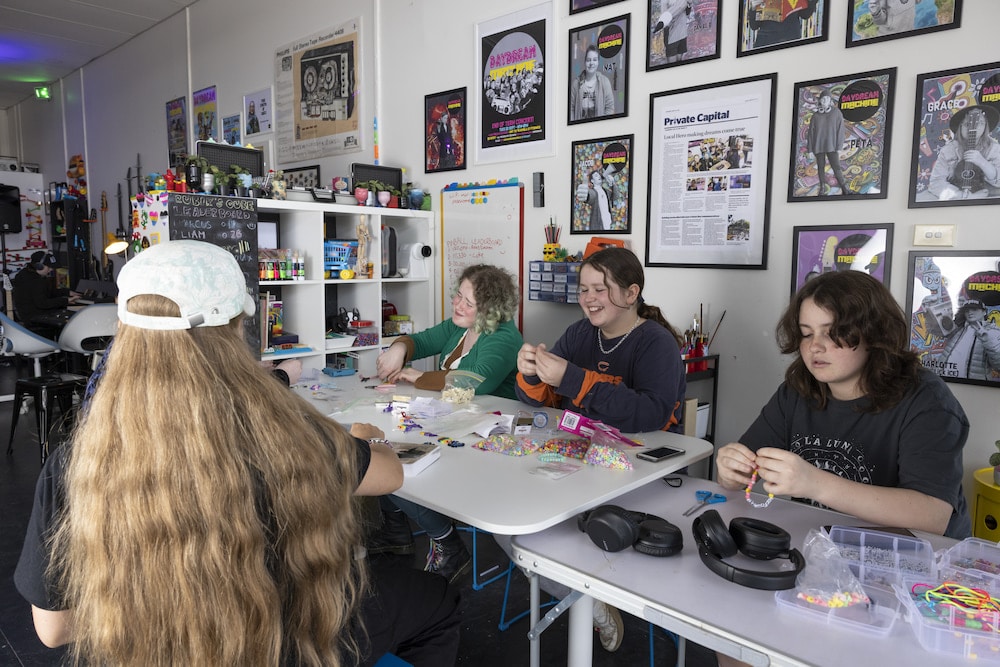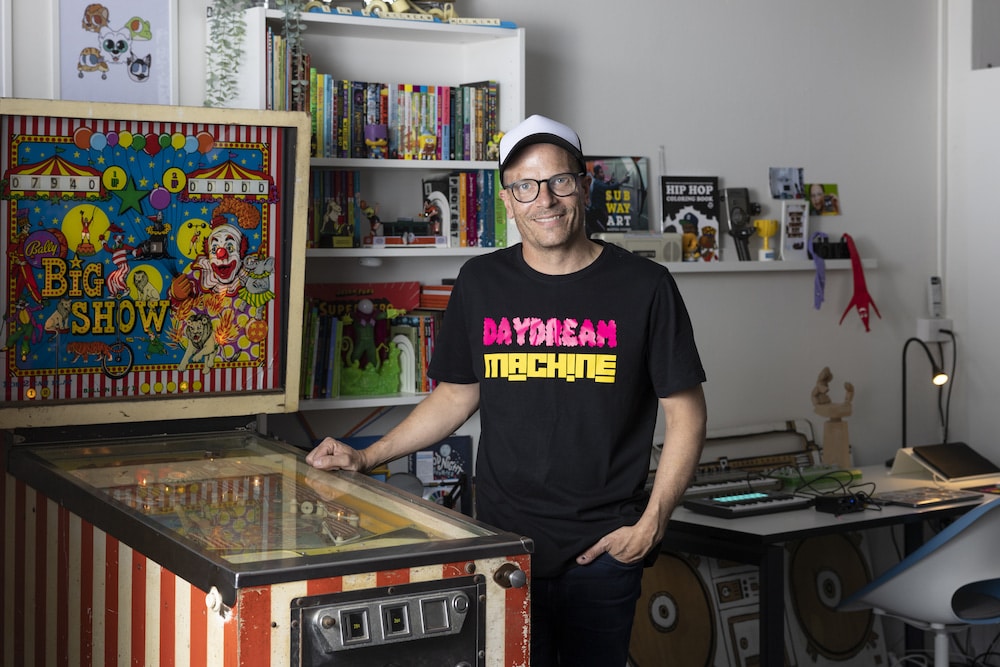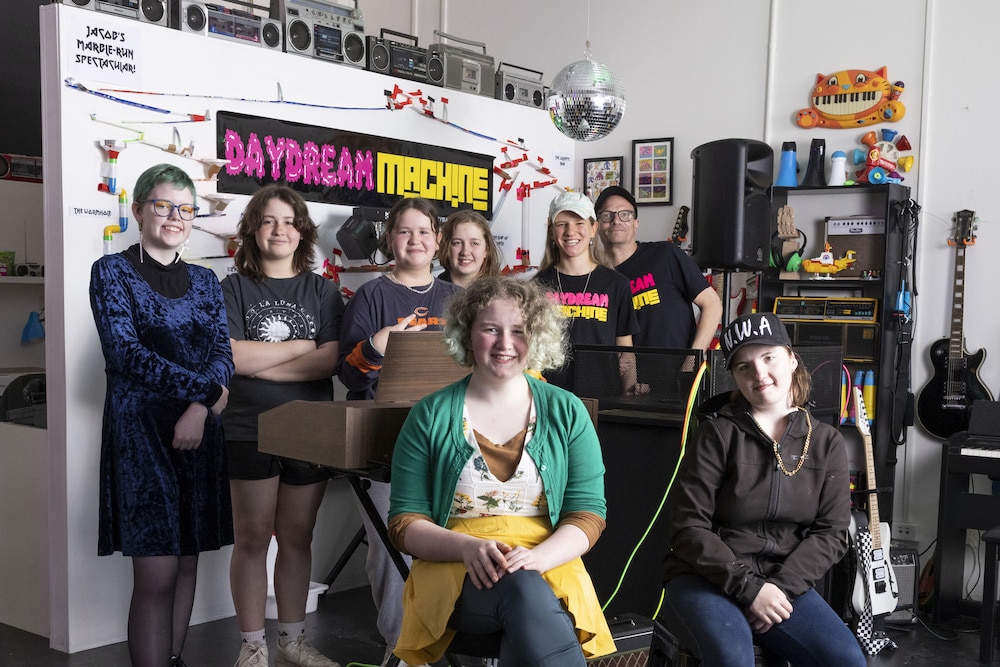The young people at Daydream Machine, a music, moviemaking, and STEAM studio in Fyshwick, are neurodiverse – most have high-functioning autism, some have ADHD – but to the studio’s founder, ACT Local Hero of the Year, Luke Ferguson, these neurodivergent kids are superheroes.
They are, he says, incredibly talented: singers, musicians, artists, animators, and writers, they are winning awards, and getting paid for their work.
Next Saturday, 10 December, for the International Day of People with Disability (I-Day), the studio will hold a half-day Expo (10am to 3pm) showcasing the students’ creativity, and launching their businesses.
The studio has received an I-Day grant from the ACT Government; funds (and profits) will be used to stage the Expo, and as seed capital for the students’ business ideas.
For sale are designer jewellery (as worn by Emma Davidson, ACT Minister for Disability and Mental Health); up-cycled potted plants (recycled bottle tops – unscrew the cap to drain); films and animation; prints, greeting cards, and mugs featuring original artwork (swirling patterns reminiscent of Van Gogh, or bold, colourful posters featuring anthropomorphised animals); designer clothing; audio books; pride flag bracelets, and more – all made by the students. A great opportunity to buy Christmas presents and support a good cause.
The Daydream Machine musicians and stand-up comedians will perform on the day.

Daydream Machine (motto: “Cool kids doing cool stuff”) operates from a 100-square-metre studio in Fyshwick. One corner is a mixing studio, where students record their own original tunes. One wall is an enormous marble run, with four paths, designed by one of the students. There are a ping-pong table, a pinball machine, and beanbags. Shelves are full of Lego dioramas, and remote-control cats, snakes, and cars the kids are programming and coding.
As one youngster put it: “It’s Google headquarters for kids.”
Mr Ferguson set up Daydream Machine at the beginning of the year; it quickly morphed, he said, into a talent agency for the students.
“I have students that are doing graphic design, poster designs better than anyone I know. I have young musicians who are absolutely smashing it… I’ve got young spokespeople who are really passionate about being youth ambassadors for young people with disabilities.”
On the day CW interviewed Mr Ferguson, one of his students, Charlie Grace, competed in the Battle of the Bands. Only 12 years old, she has already released a song on Spotify; won an Edstart Achievement Award; received a grant to record her album; and played at the Australian of the Year awards. Mr Ferguson can see her in five years’ time as a world-class musician.
But school was rough for Grace, Mr Ferguson says. She was the first student diagnosed with autism in her school year. She had always felt different from other children, but could never figure out why. When she was diagnosed, she hid the fact from her classmates for six months – until someone very special sent her a message: 2021’s Australian of the Year, Grace Tame.
In her video, Ms Tame revealed that she, too, had autism. “Little known fact: I also have ASD, so we’re twins in lots of ways.”
Her younger namesake promptly shared the video on her classroom group chat, breaking the news to her classmates that she had autism. That message, Mr Ferguson said, was “life-changing”. Young Grace is now far more confident, far more mature.
That, Mr Ferguson said, is why he set up the studio: “To build up these kids to realise that, yes, they may be neurodiverse, but that makes them so interesting, and gives them talents that other people don’t have. These kids are superheroes. They’re starting to realise that they are capable of incredible things.”
How many kids hold discoes with the United Nations, he asks? Daydream Machine did that in September, at one of the students’ schools. In November, their band performed a showcase gig at the University of Canberra – a paid gig, at that. A graphic designer is selling his animated GIFs; another student is selling prints. Students are receiving recognition for their work, and winning competitions.
“It’s a lightbulb moment for them that if you put the hard work in, you can get rewards for your talents,” Mr Ferguson said.
“I couldn’t be any prouder of the kids; it’s setting up realistic, exciting career pathways for kids in an area of their interest.”

Daydream Machine was named a business finalist in the Chief Minister’s Inclusion Award next week; they will find out the result three days before the expo. In October, at the ACT Children’s Week Awards, Daydream Machine won awards for Business Contribution and Community for Children; one student won the Children’s Commissioner’s Award; and three were awarded Exceptional Young Person Awards.
“It’s recognition for the kids,” Mr Ferguson said. “They can see we’re on other people’s radars. We’re tucked away here in Fyshwick doing our thing, but we’re making waves… You can just see the self-belief in the kids growing day by day.”
Mr Ferguson had wanted to set up the studio for the best part of two decades. When they were in their early twenties, he and his wife fostered an 11-year-old boy. They bonded quickly over their love of hip-hop; Mr Ferguson taught him how to make his own beats on a music program. Today, that boy is a hip-hop producer, selling beats to famous bands in New York.
“That was a lightbulb moment,” Mr Ferguson said. “This made a huge impact on this young boy’s life. It gave him a sense of purpose and belief. I was certain this could work on a larger scale.”
Fifteen years later, as a youth support worker at the Woden School, Mr Ferguson set up a music program, teaching students music, graphic design, and event organisation.
His “left-field” approach to music – “synthesisers and drum machines, Frankensteining stuff together, experimenting with sounds, cutting and pasting it all together on computers” – lends itself perfectly to neurodiverse children, who often find learning music boring.
When he was named ACT Local Hero of the Year, he realised the time had come to make his long-cherished dream a reality. “That was the kickstart. If I’m ever going to do it, this is a sign to set up your own studio for neurodiverse kids.”
And making dreams come true, after all, is what the studio is about.
“The studio is the Daydream Machine,” he told his students. “If you can dream it, we’ll make it happen.”
Daydream Machine Expo, 10/19 Kembla St, Fyshwick, Saturday 10 December 10am-3pm.



